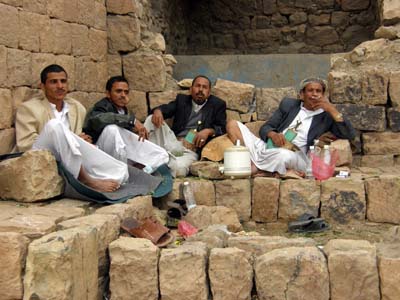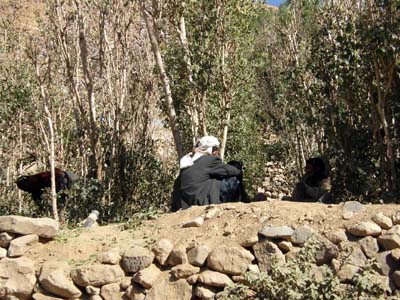It's a daily male ritual that can take up to six hours - enough to make one's teeth ache and cheeks bulge - and yet Yemen's national pastime of chewing qat (a stimulant to some, a doping agent to others), has increased to alarming proportions and drawn larger numbers of women.
 Jaw breaking "takhzeen" (Abu-Fadil)
Jaw breaking "takhzeen" (Abu-Fadil)
"I really enjoy my qat sessions and find they invigorate me," said Suad (not her real name) during an all-female chewing party grouping civil society activists, journalists, employees of international organizations, a German graduate student, a Yemeni-American researcher and two Lebanese visitors.
Men and women chew qat in gender-specific sessions, although some avant-garde families hold mixed gatherings.
Suad said the effects of the stronger quality (and more expensive) qat she chewed helped her whiz through in three hours office reports that would normally take several days, admitting that the after-effects were lethargy and exhaustion following an evening of highs.
Aficionados at the party cautioned novices not to chew too fast and to avoid swallowing the small leaves washed of dust and pollutants and dried meticulously. The novices were advised to grab a small bunch, push it into their cheek, chew slowly, then take another bunch and repeat the exercise, until the cheek was full blown.
Chewers can still eat, drink and smoke if they wish, the regulars said.
Randa, the hostess, leads a double life. The thirty-something divorcée and mother of a preteen is an ambitious and hyperkinetic head of a women's NGO with aspirations of becoming the country's president.
On her qat afternoons/evenings, the attractive diminutive veiled woman turns into a vivacious throw-it-all-to-the-wind party animal dressed in the skimpiest shimmering skirt and plunging neckline sleeveless top.
"I really get my kicks from qat and love sharing this experience with friends," she said of get-togethers she organizes or attends at least every other day.
After a generous lunch at a popular restaurant, she invited several co-workers and like-minded women to a qat chewing session at her home that included smoking the Yemeni "shisha," or water pipe, nibbling on finger foods, drinking raw ginger juice mixed with milk and sugar, dancing, singing and showing off the latest revealing fashions.
While not minding the presence of curious visitors, Randa and the others requested that no pictures be taken of their frolicking, notably since several were well known in Yemeni society and feared the exposure would undermine their careers. What did not bother them was Randa's child coming in and out of the room and witnessing the group chew.
"High blood pressure, tooth decay, constipation, hemorrhoids, hernias, paranoia and depression are among the direct health hazards posed by regular qat chewing," said World Bank sustainable development expert Julie Valoria-Williams.
 Stupefying qat chewing and smoking in Sana'a suburbs (Abu-Fadil)
Stupefying qat chewing and smoking in Sana'a suburbs (Abu-Fadil)
She told the Yemen Times that in many families, children as young as seven start chewing because of parental influence, with uneducated mothers considering qat a means of binding their offspring to the family.
A merchant in Sana'a's old town market pointed to his five-year-old brother and told this writer the little boy occasionally chewed qat.
Yemen is one of the poorest Arab countries with a population of over 23 million and some 60-70% illiterates, by some estimates. According to the Yemeni Ministry of Agriculture, quoted by the Yemen Times, qat is the country's leading crop and accounts for 35% of total agricultural production.
The plant, known by the botanical term catha edulis forskal, is grown, sold and used legally in that country at the southern tip of the Arabian Peninsula. Its leaves could be small or large, green or a mixture of green tinged with reddish brown.
It is grown in backyards, fields, along roads and highways and even on the premises of historic tourist attractions, and, is harvested year-round.
 Qat field on road to Makhtan Dam (Abu-Fadil)
Qat field on road to Makhtan Dam (Abu-Fadil)
 Qat growers reap crop (Abu-Fadil)
Qat growers reap crop (Abu-Fadil)
It is also slicing into Yemenis' meager incomes, leading to family breakups and sapping a dwindling supply of water needed for fruits, vegetables and grazing. Qat consumes 23% of Yemen's total water supply and 25% of that used for agriculture, the Yemen Times reported.
But qat farmers view it as a fast cash crop and large supplies of it are sold in Saudi Arabia, Dubai and other Gulf countries where it is cheaper than hard drugs.
"The bunch is for 400 riyals ($2)," said a village qat hawker to a visitor. Another tradesman offered a higher quality for 1,00 riyals ($5). Rich users can pay a few hundred dollars for the "very special" grades of the plant.
 Yemeni villagers buy/sell qat in open (Abu-Fadil)
Yemeni villagers buy/sell qat in open (Abu-Fadil)
Yemenis making $6 or less per day and supporting families are undeterred by the cost and health hazards, to the dismay of reformers who see qat as the major hindrance to their country's development.
But the ubiquitous habit is hard to break, and business comes to an almost screeching halt after lunch when countless Yemenis on the street, in offices (if they're still working), in the cities' markets, and in outlying villages grab bunches out of plastic bags and start their quotidian "takhzeen," or storing of the leaves into their cheeks.

 Young merchants chewing away (Abu-Fadil)
Young merchants chewing away (Abu-Fadil)
On a recent business trip to Yemen, my driver was upset when after a morning of driving me to meetings around Sana'a I asked to be taken to the old town for some sightseeing and shopping. It cut into his daily afternoon "takhzeen."
Perhaps the only time Yemenis somewhat abstain is during the Muslim holy fasting month of Ramadan, but many turn to the mild narcotic after sundown when they break their fast.
"I wish the government would pass laws banning qat and punish those growing and selling it," said an exasperated Yemeni female journalist deriding her compatriots for their laissez-faire attitude. "We need to catch up with the rest of the world, not stay stuck in our under development."